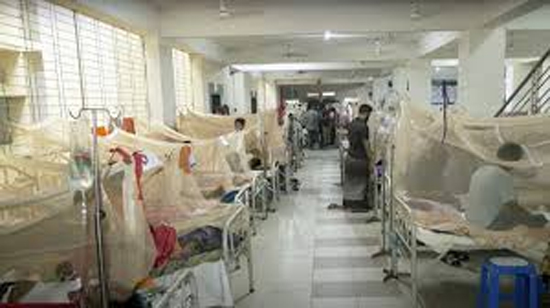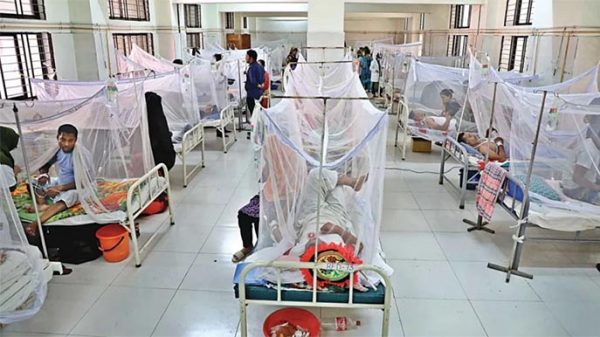Colon Cancer: Everything You Need to Know

- Update Time : Monday, 5 February, 2024, 02:41 pm
- 160 Time View

Online Desk: Colorectal cancer, or colon cancer as it is commonly known, is a type of cancer that develops at the rectum or colon of the human body. WHO reports that colon cancer is the third leading type of cancer globally with 10% of all reported cases. It is also the third highest reason for cancer-related deaths. Let’s take a detailed look into the fatal disease, what causes it, and how people can potentially save themselves from colon cancer.
How Does Colon Cancer Develop?
The colon or the rectum is the terminal point of the digestive system. It is essentially a sac that houses the bowel and aids in the bowel movement process. The lining of the colon can develop precancerous polyps which can become cancerous over time.
It is important to note that all polyps are not cancerous. However, it is needed to medically treat them at the earliest as there is always the chance of it developing into cancer cells.
The exact cause of polyp development is unknown. However, scientists have often pointed out that genes and age play a crucial role in their development. Other factors like diets, obesity, smoking, and inflammation of the colon lining have been identified as leading causes thus far.
What are the Symptoms and Causes of Colon Cancer?
Symptoms of colon cancer include:
Change in Bowel Movement
As a precursor to colon cancer, a patient often notices a significant shift in bowel movement. For example, the frequency of diarrhea, constipation, or a change in stool consistency is noticed.
Blood Discharge
A common symptom of colon cancer is the presence of blood in the stool. Patients may not feel any apparent discomfort but dark tarry stools may be noticed during bowel movement.
Pain in the Abdomen
Another common symptom of colon cancer is severe and lasting pain in the abdomen. It generally starts as mild discomfort and gradually moves to severe cramps.
Anemia
The blood discharge with stool may trigger anemia or loss of red corpuscles in the blood. Anemia also triggers weakness and fatigue which is a secondary symptom of colon cancer.
Unexpected Weight Loss
Another sign of any cancer in general is the unexpected loss of weight. Cancer patients including colon cancer ones tend to rapidly lose weight which may lead to secondary complications.
There are several known causes of colon cancer. These include:
Age
Age is one of the commonly identified factors behind colon cancer. Anyone over the age of 50 is at risk of contracting colon cancer though it might occur at any age.
Family History
Genetics are also thought to be a reason behind colon cancer. Families with a history of Familial Adenomatous Polyposis or FAP and Lynch Syndrome tend to compound the chances of contracting colon cancer.
Personal Medical History
Colon cancers are often recurring, meaning they can come back even if it is treated completely. A personal medical history of colon cancer or repeated polyp formation may trigger renewed cancer cell generation in the colon linings.
Additionally, Inflammatory Bowel Diseases or IBDs like ulcerative colitis and Crohn’s disease increase the risk of contracting colon cancer. Patients with Type 2 diabetes also run the risk of developing colon cancer.
How Does it Affect People?
The effect of cancer on the human body is more or less similar in each case. It is a carcinogen that destroys the body from within. With advanced treatments, almost all types of cancers can be treated, provided they are identified at the earliest stage.
But regardless of the identification and treatment, cancer leaves long-lasting effects on the human body that might take years to properly recover.
Physical Discomfort
Patients of colon cancers develop physical symptoms like abdominal pain, discomfort, cramps, and blood discharge with bowel movements. Colon cancer patients are reported to lose considerable weight and their general well-being is greatly hampered.
Fatigue
Almost all types of cancers bring fatigue in their wake. Fatigue is induced because of the cancer itself, as well as the treatments such as surgery, chemotherapy, or radiation therapy.
Emotional Stress
Cancer is often looked upon as a dreadful disease. The fear of the unknown and uncertainty involved with the disease naturally induces stress, anxiety, and depression. Emotional stress eventually adds up as a secondary condition to the existing physical stress.
Treatment Side Effects
Patients of colon cancer undergo rigorous treatment procedures like surgery, chemotherapy, and radiation therapy. These treatments often induce side effects like nausea, vomiting, hair loss, changes in taste, and other discomforts.
Lifestyle Choices that are Risk Factors for Colon Cancer
Lifestyle also plays a significant role in increasing the risk of contracting colon cancer. Here’s what to consider.
High Consumption of Processed Food
High consumption of processed food, especially red and other processed meat increases the risk of contracting colon cancer.
Low-Fiber Diet
A low-fiber diet also increases the risk of colon cancer. Try and incorporate fresh vegetables, fruits, salads, and whole grains into your daily diet to reduce the risk.
Lack of Physical Activity/Obesity
Increased weight and lack of physical activity create metabolic imbalances that act as precursors to colon cancer. Try to incorporate light exercise on a routine basis as well as maintain the ideal BMI.
Excessive Alcohol Consumption
Excessive alcohol consumption may also lead to colon cancer down the line. Additionally, smoking is also linked with the disease. It is better to limit consumption or if possible, avoid them altogether.
A simple lifestyle management alone isn’t enough to guarantee a risk-free life. However, a balanced lifestyle can at least minimize the probability of colon cancer and other fatal diseases.
Final Words
With its high fatality rate, it is necessary to diagnose colon cancer and start the treatment at the earliest. Check for the symptoms and consult the doctor as soon as possible. In most cases, colon cancer symptoms overlap with piles and benign polyps.
















